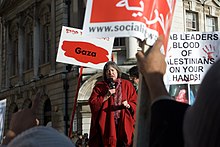Clare Short
She also resigned the party whip in 2006 and served the remainder of her term as an independent politician, leaving parliament at the 2010 general election.
She gained some notoriety shortly after her election in 1983 when she implied the government's Employment minister Alan Clark was drunk at the despatch box.
In 1986, Short introduced a Private Members Bill in the House of Commons which proposed banning Page 3 photographs of topless models featured in The Sun and other British tabloid newspapers.
In 1989 she raised the issue of abuse of police procedure and fabrication of evidence at the West Midlands Serious Crime Squad, relaying concerns of Birmingham solicitors that many miscarriages of justice had taken place.
This remark caused great offence to the Montserratians and others; Labour MP Bernie Grant said that "She sounds like a mouthpiece for an old nineteenth century colonial and Conservative government.
[24] In 2001, she wrote that the "ready availability of small arms has a direct and negative impact upon levels of crime and conflict in developing countries.
[27] On 9 March 2003, Short repeatedly called Tony Blair "reckless" in a BBC radio interview[28] and threatened to resign from the Cabinet in the event of the UK Government going to war with Iraq without a clear mandate from the United Nations.
But undermining international law and the authority of the UN creates the risk of instability, bitterness and growing terrorism that will threaten the future for all of us.
[30] On 26 February 2004, Short alleged on the BBC Today radio programme that British spies regularly intercept UN communications, including those of Kofi Annan, then Secretary-General.
[32] The same day, on the BBC's Newsnight programme, Short called Blair's response "pompous" and said that Britain had no need to spy on Kofi Annan.
A few days later, on 29 February, Short appeared on ITV's Jonathan Dimbleby programme, on which she revealed that she had been written to by Britain's most senior civil servant, Cabinet Secretary Andrew Turnbull.
Turnbull's confidential letter (which Short showed to Dimbleby, and which was quoted on the programme) formally admonished her for discussing intelligence matters in the media, and threatened "further action" if she did not desist from giving interviews on the issue.
Either course of action have been without recent precedent; at the time, no Privy Counsellor had been expelled since Sir Edgar Speyer was accused of collaborating with the Germans during the First World War.
[36] In December 2004, Short was reportedly critical of US efforts to dispense aid to countries devastated by a tsunami caused by a massive earthquake in the Indian Ocean.
[citation needed] Short has condemned Israel as being guilty of "bloody, brutal and systematic annexation of land, destruction of homes and the deliberate creation of an apartheid system."
She has also stated that "the EU and Britain are colluding in this operation and the building of a new apartheid regime" because they give Israel privileged trade access.
[40][41] According to The Guardian, Short accepted £1,580 worth of flights, hotel accommodation, food and travel expenses from al-Manar Television in Lebanon in 2008.
Short said her trip had been registered with Commons authorities and that the visit allowed her to see how reconstruction in southern Lebanon was proceeding after the country's conflict with Israel in 2006.
[43] In a brief statement, Short said she was "ashamed" of Tony Blair's government and backed proportional representation, which she hoped would be achieved through a hung parliament.
During this she repeatedly criticised Tony Blair, Attorney General Peter Goldsmith and others in the UK Government for allegedly deceiving her and other MPs in an attempt to obtain consent for the invasion of Iraq.
[55] In January 2011, Short expressed an interest in becoming a candidate for the Mayor of Birmingham, pending the outcome of a referendum on the creation of a directly-elected mayoralty in the city.
Short explained: "People want to make socialism mean the Soviet Union and so on, but it also meant Clement Attlee becoming British Prime Minister in 1945, and the development of the welfare state across Europe after the war: actions that produced the best and most civilised time we have ever experienced.
In her book An Honourable Deception, she describes how "after losing his parliamentary seat, he moved from being a senior Labour MP to running my constituency office where he gave me enormous support as well as bringing great experience to the task.
Later he decided to return to the Bar, but after a time got himself into various difficulties and I began to suspect that either he was suffering a deep depression or mental deterioration.
"[61] Lyon died in Milton Keynes[62] that year from Alzheimer's disease aged 61 and was survived by his two sons Marcus and Adrian, and a daughter, Rebecca, all from a previous marriage.
In June 2009, Short received an honorary degree of Doctor of Laws from the University of Ulster in recognition of her services to international development.

